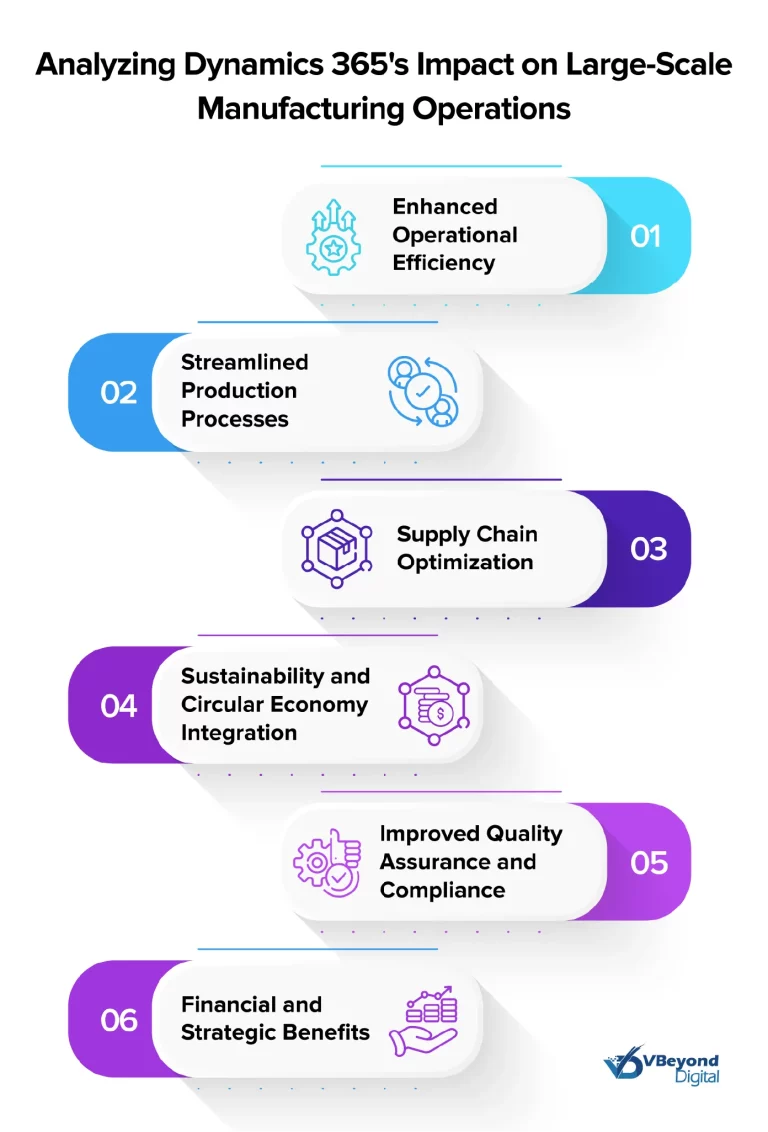Dynamics 365 in Manufacturing: Success Stories of Achieving Digital Operational Excellence
Section
Section
This blog presents a series of success stories that showcase the effective use of Dynamics 365 in manufacturing settings. Each story highlights how different enterprises have integrated Dynamics 365 to upgrade their operational processes, resulting in measurable gains in productivity and efficiency. Readers will gain insights into practical applications and the significant benefits that can be achieved through the targeted deployment of Dynamics 365 technology in the manufacturing sector.
In 2024, the global manufacturing market achieved a value-added total of $8.6 trillion, signifying an enduring upward trend that illustrates the critical role of technology in nearly all aspects of modern manufacturing. This growth is driven by digital transformation and smart manufacturing practices that integrate advanced technologies across operations.
Microsoft Dynamics 365 facilitates comprehensive integration of business processes through its cloud-based CRM and ERP solutions, empowering manufacturers with enhanced data visibility and operational efficiency. This platform supports advanced manufacturing technology applications, including IoT and AI, aligning with the latest manufacturing industry trends to optimize production and decision-making processes.
This blog explores various case studies demonstrating the application of Dynamics 365 in manufacturing settings, highlighting real-world applications of the platform to transform operations, benchmarks, and improve revenues and overall efficiency.
Digital Transformation with Dynamics 365 in Manufacturing
Dynamics 365 has been incrementally transforming the manufacturing sector by bridging the gap between traditional manufacturing processes and modern technological advancements. The integration of Dynamics 365 within manufacturing operations is pivotal for enhancing efficiency, reducing costs, and driving innovation. Here’s how Dynamics 365 is shaping the future of manufacturing:
- Unified Data and Intelligent Technology: Dynamics 365 helps break down silos across various departments by integrating CRM and ERP systems into a unified platform. This integration facilitates better data sharing and decision-making across all business units, enhancing operational efficiency and business intelligence.
- AI and Automation: The platform’s AI capabilities are transforming manufacturing floors into intelligent environments that significantly boost productivity and operational agility. Dynamics 365 leverages AI to automate processes, predict maintenance needs, and optimize manufacturing operations, making factories smarter and more responsive to real-time changes.
- Supply Chain Innovation: Dynamics 365 offers advanced tools for supply chain management, helping businesses gain end-to-end visibility and insights that enhance forecasting, inventory management, and overall supply chain efficiency. Manufacturers are using Dynamics 365 to integrate IoT and AI technologies, which helps in predictive maintenance and smarter supply chain decisions.
- Enhancing Customer and Employee Experiences: The platform improves engagement by providing manufacturers with the tools to deliver personalized customer experiences and enhance employee productivity. Dynamics 365 integrates with Microsoft Teams and other communication tools to facilitate better collaboration and information flow across the workforce.
- Sustainability and Resilience: Dynamics 365 supports manufacturers in adopting more sustainable practices and building resilient supply chains. By providing deeper insights into production processes and resource utilization, manufacturers can optimize operations to reduce waste and improve sustainability outcomes.
- Statistical Insights: A sizable portion of frontline manufacturing workers appreciate the job opportunities created by new technologies, illustrating the positive reception of tech-driven transformations in the industry.
Case Study 1: North American Machinery Manufacturing Transformation
Problem: Ecolab faced significant challenges in maintaining operational efficiency across its global sites, particularly in providing real-time support and resolving issues quickly without incurring high travel costs and downtime.
Solution: The company implemented Microsoft Dynamics 365 Remote Assist to enable real-time remote collaboration between field technicians and remote experts. This solution utilizes mixed reality technologies to overlay schematics and real-time data onto the technicians’ field of view, allowing for immediate guidance and problem resolution.
Benefits: The adoption of Dynamics 365 Remote Assist led to several tangible benefits for Ecolab:
- Reduced Resolution Time: Issues that previously took days to resolve were handled in significantly less time, with Ecolab reporting issue resolution five days faster on average, preventing about four hours of production downtime per incident.
- Cost Savings: The solution dramatically cut travel expenses by avoiding trips for expert consultations and inspections, saving an estimated $53,550 in travel costs annually for expert visits alone.
- Increased Productivity: By shifting 50% of inspections to virtual settings, field technicians improved first-time fix rates and reduced the labor needed for tier 2 and tier 3 issue resolutions by up to 75%.
- Sustainability and Safety: The remote assist technology not only aligned with Ecolab’s sustainability goals by reducing travel-related carbon emissions but also improved worker safety by minimizing the need for physical presence in potentially hazardous environments.
Case Study 2: Snack Food Manufacturing Modernization
Problem: Bel Fuse, a manufacturer of electronic circuit products, faced significant challenges with its highly customized and outdated Oracle ERP system. This system was costly to maintain, difficult to update, and lacked the agility needed to respond quickly to market changes. The company operated across 24 locations globally, which further complicated its enterprise resource planning due to the disparate systems used by different business units.
Solution: To address these challenges, Bel Fuse implemented Microsoft Dynamics 365 Finance and Dynamics 365 Supply Chain Management. This integration provided a unified system for the first time, streamlining their finance and operations processes. Dynamics 365’s capabilities allowed Bel Fuse to automate financial operations, improve global supply chain visibility with advanced MRP functions, and enhance manufacturing productivity through AI and IoT technologies.
Benefit: The adoption of Dynamics 365 resulted in substantial cost savings and operational efficiencies for Bel Fuse. By moving away from the customized Oracle system to Dynamics 365, Bel Fuse saved nearly USD 2 million annually in IT service and support fees. The new system also brought enhanced visibility and agility to the company’s operations, enabling more accurate forecasting and responsive supply chain management. During the COVID-19 crisis, the cloud-based ERP system allowed employees to effectively manage remote finance and supply chain operations, demonstrating the system’s adaptability to changing circumstances.
Case Study 3: Broader Application Across Various Manufacturing Domains
Problem: Saint-Gobain, a global leader in sustainable, high-performance building materials, faced challenges in maintaining optimal operational efficiency due to the geographical dispersion of their experts. The requirement for in-person expert intervention for machine maintenance and training led to delays and increased costs.
Solution: The company implemented Microsoft Dynamics 365 Remote Assist to overcome these barriers. This solution enables real-time remote collaboration between onsite technicians and remote experts using mixed reality technology. Through Dynamics 365 Remote Assist, experts can provide immediate guidance, visually annotate real-world objects, and share documents in real time, directly within the technicians’ field of view.
Benefits: The integration of Dynamics 365 Remote Assist transformed Saint-Gobain’s maintenance and training processes by:
- Reducing Response Times: Issues are now addressed much faster, as experts can guide onsite technicians in real-time, significantly reducing the downtime associated with maintenance.
- Cost Savings: The need for expert travel is dramatically reduced, leading to significant savings in travel costs and time.
- Enhanced Training: On-the-job training is more effective and immediate, as experts can overlay instructions on real-world tasks, enhancing the learning experience and retention of knowledge.
- Sustainability Impact: By minimizing the need for travel, Saint-Gobain has aligned its operations with sustainability goals, reducing its carbon footprint.
Section
Section
Achieve manufacturing excellence with Dynamics
Analyzing Dynamics 365’s Impact on Large-Scale Manufacturing Operations
The deployment of Dynamics 365 in manufacturing industries demonstrates profound efficiency gains and operational enhancements across various domains. Here are the key impacts observed:
1. Enhanced Operational Efficiency
- Dynamics 365 integrates seamlessly with existing Manufacturing Execution Systems (MES), ensuring real-time data coherence and eliminating manual data entry errors. This integration supports more accurate and timely decision-making across production and enterprise systems.
- The incorporation of AI and IoT technologies facilitates predictive maintenance and proactive service management, which reduces downtime and extends the lifespan of manufacturing equipment.
2. Streamlined Production Processes
- Priority-based planning features in Dynamics 365 allow manufacturers to manage supply chain priorities effectively, ensuring that urgent demands are met promptly without the need to manually sort through orders. This optimization not only improves service levels but also reduces excess inventory.
- Real-time visibility of the shop floor provided by Dynamics 365 helps in quick identification and resolution of production bottlenecks, enhancing throughput and product quality.
3. Supply Chain Optimization
- Dynamics 365 facilitates deep visibility into supply chains, offering manufacturers early insight into potential delays and shortages. This enables better coordination with suppliers and smoother production flows, minimizing disruption risks.
- Advanced analytics and AI-driven tools within Dynamics 365 help in optimizing logistics and inventory management, leading to significant cost reductions and improved service levels.
4. Sustainability and Circular Economy Integration
- Dynamics 365 supports circular economy initiatives by managing reverse logistics processes effectively. This sustainability strategy is vital for manufacturers looking to enhance environmental stewardship and comply with regulatory standards.
- By enabling efficient resource management and waste reduction, Dynamics 365 helps companies meet their sustainability goals and improve overall operational resiliency.
5. Improved Quality Assurance and Compliance
- Quality assurance tools integrated within Dynamics 365 ensure consistent product quality and compliance with industry standards. Automated quality checks reduce human error and enhance the reliability of manufacturing outputs.
- Real-time data analysis allows for immediate adjustments in the production process, ensuring that products meet strict regulatory and quality standards.
6. Financial and Strategic Benefits
- The total economic impact of implementing Dynamics 365 includes significant financial savings due to increased production volume, reduced equipment downtime, and improved production quality.
- Manufacturers report enhanced flexibility and an improved ability to meet delivery timelines, which in turn boosts customer satisfaction and supports long-term business growth.

Implications for Future Manufacturing Trends
The future of manufacturing is inherently tied to advancements in Dynamics 365, which is spearheading transformations across various facets of the industry. As we look ahead, several key trends powered by Dynamics 365 are poised to redefine the manufacturing landscape:
1. Integration of AI and Machine Learning: AI and ML are becoming integral to manufacturing operations, providing critical insights that drive efficiency and innovation. Dynamics 365 integrates these technologies to enhance capabilities like predictive maintenance, demand forecasting, and operational optimization. This integration helps manufacturers reduce downtime and improve their supply chain responsiveness.
2. Enhanced Supply Chain Resilience: Recent global disruptions have underscored the need for robust supply chain frameworks. Dynamics 365 helps build resilience by offering advanced tools for real-time visibility and analytics, enabling manufacturers to anticipate disruptions and react swiftly. This trend towards building “agile factories” is crucial in maintaining continuous operation and meeting market demands efficiently.
3. Empowering the Workforce with Digital Tools: The digital transformation in manufacturing extends to the workforce, where Dynamics 365 is used to equip employees with tools that enhance collaboration and productivity. The integration of mixed reality and digital twins are examples of how real-time data and simulations can train and support employees, making complex manufacturing processes more accessible and understandable.
4. Commitment to Sustainability: Manufacturers are increasingly leveraging Dynamics 365 to meet sustainability goals. This includes optimizing energy use, reducing waste through improved asset management, and utilizing data to enforce better compliance with environmental regulations. The ability to track and analyze every part of the manufacturing process helps in making more informed decisions that align with sustainability objectives.
5. Advanced Robotics and Automation: The deployment of robotics and automation technologies continues to grow, with Dynamics 365 at the helm facilitating seamless integration. These technologies not only enhance manufacturing precision and efficiency but also help in creating safer work environments by automating high-risk tasks.
6. Personalized and Enhanced Customer Experience: Dynamics 365 fosters a more personalized interaction with customers by leveraging data analytics and AI to predict customer needs and tailor services accordingly. This capability ensures that manufacturers can offer enhanced services that are proactive rather than reactive.
Conclusion
In summarizing the impact of Dynamics 365 in manufacturing, it is clear that the platform not only enhances operational efficiency but also drives innovation through the integration of advanced technologies like AI and IoT. By providing a comprehensive view of both front and back-office operations, Dynamics 365 allows manufacturers to anticipate market changes and react swiftly, ensuring sustained competitiveness in a rapidly evolving sector. For manufacturers looking to make their operations smarter and embrace the next wave of industrial innovation, Dynamics 365 offers a robust platform capable of transforming traditional manufacturing processes into smart, efficient systems.
To explore how Dynamics 365 can be tailored to your manufacturing needs, request a consultation with our team at VBeyond Digital, a certified Microsoft Partner.




